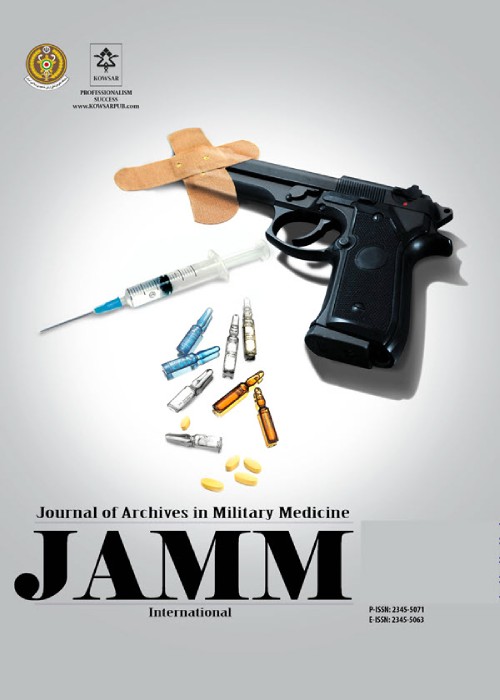A Retrospective Study Evaluating Sexually Transmitted Diseases in Military Personnel During Deployment. Is There a Need to Change Current Practices?
Author(s):
Article Type:
Research/Original Article (دارای رتبه معتبر)
Abstract:
Background
Historically, the US Military has made significant contributions toward the treatment and prevention of common sexually transmitted infections (STI) including syphilis, gonorrhea, and human immunodeficiency virus. Although there have been numerous studies evaluating the prevalence of STIs among service members, there is a lack in studies that evaluate the prevalence of STIs acquired by U.S. military personnel during the deployment period.
Objectives
The objective of this study is to evaluate the rates of sexually transmitted infections (STI) among U.S. military personnel within the deployment period to determine if further studies are needed to evaluate its significance on public health.
Data Sources
We retrospectively collected data published between the years 2005 to 2018 of US military active duty members who tested positive for human immunodeficiency virus (HIV), human papillomavirus (HPV), herpes simplex virus I (HSV I), herpes simplex virus II (HSV II), Chlamydia trachomatis (CT), Neisseria gonorrhoeae, and Syphilis. We performed a literature review using Medline, PubMed, and Google Scholar to collect data from publications related to sexually transmitted infections among U.S. military servicemen published between the years 2005 - 2018.
Study Eligibility Criteria
Inclusion criteria for post-deployment group included those who tested positive for a given STI during deployment (time spent during active duty) and those who tested positive in the period up 180 days upon returning from deployment.
Results
The total sample size from our study included 4984014 active duty military personnel, of which 1321706 (27%) individuals had a prior history of deployment. From the total sample size, 265886 (5.3%) of service members had a positive STI diagnosis. Among those with a positive STI diagnosis, 9083 (1.7%) were diagnosed while they were deployed, whereas 14121 (2.7%) were diagnosed in within 180 days of returning home.
Conclusions
Although there is insufficient data regarding pre-deployment versus post-deployment rates of sexually transmitted infections, the available data we analyzed regarding post-deployment STI suggests that it may be beneficial to screen service members for common STIs immediately upon return from deployment. Individuals who are predisposed to participating in high risk sexual behavior pose a higher risk of returning home with a sexually transmitted infection. Therefore, a screening questionnaire administered upon return from deployment to stratify high risk sexual behavior would be beneficial in identifying individuals that need to be tested for STIs. Deployed soldiers returning home with STIs have the potential to infect their spouses/significant others. In addition, the risk of untreated STIs has the potential to pose a public health issue, especially when considering that overseas deployed soldiers may contract strains of viruses or bacteria that have the potential to develop resistance to current standard of treatment within the United States. Additional studies are needed to further evaluate the prevalence of sexually transmitted infections among the post-deployment group.Keywords:
Language:
English
Published:
Journal of Archives in Military Medicine, Volume:6 Issue: 4, Dec 2018
Page:
8
magiran.com/p1932404
دانلود و مطالعه متن این مقاله با یکی از روشهای زیر امکان پذیر است:
اشتراک شخصی
با عضویت و پرداخت آنلاین حق اشتراک یکساله به مبلغ 1,390,000ريال میتوانید 70 عنوان مطلب دانلود کنید!
اشتراک سازمانی
به کتابخانه دانشگاه یا محل کار خود پیشنهاد کنید تا اشتراک سازمانی این پایگاه را برای دسترسی نامحدود همه کاربران به متن مطالب تهیه نمایند!
توجه!
- حق عضویت دریافتی صرف حمایت از نشریات عضو و نگهداری، تکمیل و توسعه مگیران میشود.
- پرداخت حق اشتراک و دانلود مقالات اجازه بازنشر آن در سایر رسانههای چاپی و دیجیتال را به کاربر نمیدهد.
دسترسی سراسری کاربران دانشگاه پیام نور!
اعضای هیئت علمی و دانشجویان دانشگاه پیام نور در سراسر کشور، در صورت ثبت نام با ایمیل دانشگاهی، تا پایان فروردین ماه 1403 به مقالات سایت دسترسی خواهند داشت!
In order to view content subscription is required
Personal subscription
Subscribe magiran.com for 70 € euros via PayPal and download 70 articles during a year.
Organization subscription
Please contact us to subscribe your university or library for unlimited access!


